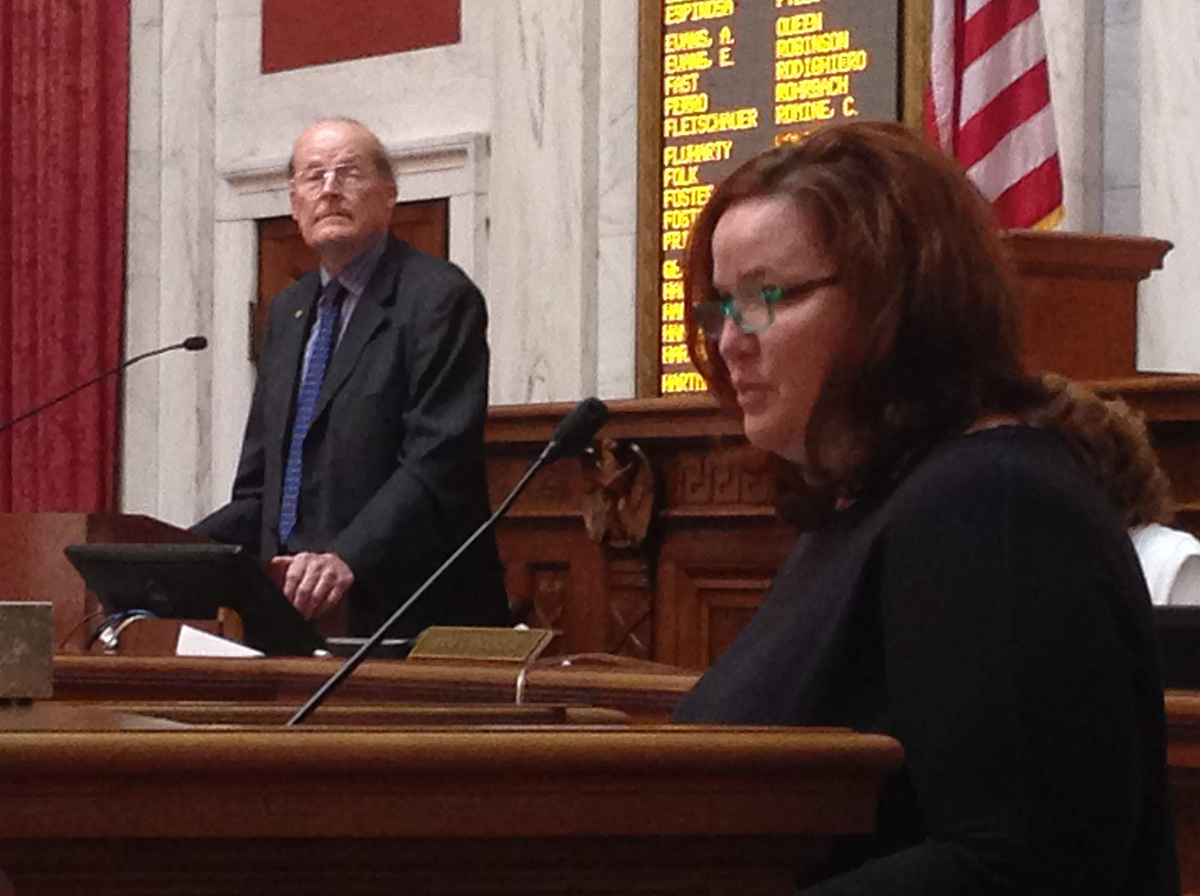By KEN WARD JR.
Charleston Gazette-Mail
CHARLESTON, W.Va. — Environmental organizations and citizen groups turned out Monday to urge lawmakers to strip from a coal industry bill language that would force state regulators to remove consideration of the diversity of aquatic communities when they assess the health of West Virginia’s rivers and streams.

(Photo by Ken Ward Jr.)
Leaders of Trout Unlimited, the West Virginia Rivers Coalition, the Sierra Club and the West Virginia Environmental Council spoke against Senate Bill 687 during a morning public hearing of the House Committee on Energy as the last week of this year’s legislative session begins.
“Water is our most important natural resource — not coal, not oil, nor natural gas,” Larry Orr of the West Virginia Council of Trout Unlimited told committee members gathered in the House chamber. “It’s just a step backward on water quality.”
Among those who spoke against the bill was Charleston lawyer Wendy Radcliff, who was fired by the Justice administration in January from her post as the head of the Office of Environmental Advocate within the Department of Environmental Protection. Radcliff said changing the way DEP officials measure stream health will not make contamination downstream from mining operations go away.

The legislation at issue started out as Senate Bill 582, a proposal from Energy, Industry and Mining Committee Chairman Randy Smith, R-Tucker and a Mettiki Coal employee. That bill would have eliminated most safety and health inspections or enforcement by the state Office of Miners’ Health, Safety and Training. The committee’s attorney, former Patriot Coal and Massey Energy lawyer Stephanie Ojeda, said that language came from the West Virginia Coal Association.
Smith backed off those changes and originated SB 687 in his committee. The bill makes relatively minor changes in state mine safety policy, such as combining various boards, but leaves in place the original bill’s proposals to weaken water quality and reclamation standards for coal operations.
Specifically, the language in the bill that most concerns citizen groups removes from the law a mandate that any rule the DEP develops for evaluating the health of streams include a determination that the stream “supports a balanced aquatic ecosystem community that is diverse in species composition.”
The bill would leave language that would require the DEP to consider only whether streams contain “appropriate trophic levels of fish, in streams that have flows sufficient to support fish populations.”
Jason Bostic, a Coal Association vice president, said the industry asked for the change to help it respond to lawsuits and court rulings about how water quality rules are established and enforced.
“These changes are there only to clarify a loophole to allow an unelected federal judge to substitute his judgment for the people in this body about what West Virginia’s narrative water quality standards should be,” Bostic said.
Coal Association President Bill Raney described the legislation as an effort to continue the “more positive attitude” about the coal industry since the election of President Donald Trump.
Raney did not claim the bill would put hundreds of miners back to work but, instead, painted the legislation as something that would “remove barriers” and help West Virginia’s producers “compete for our fair share of a diminishing market.”
Bostic, Raney and another Coal Association vice president, Chris Hamilton, were the only ones to speak in favor of the bill at Monday’s public hearing, and Hamilton said he was there to speak not for the coal group, but for the West Virginia Business and Industry Council, an umbrella group for business associations.
Twenty-six people spoke against the bill, with most of them arguing that any truly scientific examination of stream health has to look at bugs and other aquatic life, besides fish.
“Insects, crustaceans, and invertebrates are the foundation of a healthy ecosystem,” read a flier distributed at the Capitol by the Rivers Coalition and the Environmental Council. “Without them, the entire food chain breaks down. Loss of invertebrate populations is an early signal that pollution is damaging life in a stream.”
Angie Rosser, executive director of the Rivers Coalition, urged lawmakers not to allow coal companies to damage state rivers and streams and erase any legal liability for cleaning up the damage.
“There are coal companies that are breaking the law, and think they should not be able to get away with it,” Rosser said. “Don’t let us plummet to the bottom of the barrel, in terms of stream protection.”
Last week, the bill passed the Senate by a vote of 32-2.
House Energy Chairman Bill Anderson, R-Wood, said his committee is likely to take up the bill on Tuesday or Wednesday. The committee has a meeting scheduled for 2 p.m. Tuesday. The session ends at midnight Saturday.
See more from the Charleston Gazette-Mail





